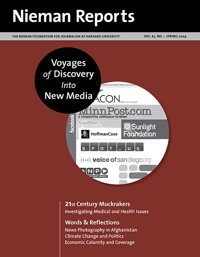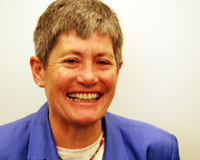 [The staff at our sister publication, Nieman Reports, is putting the finishing touches on its Spring 2009 issue. Its theme is one dear to our hearts: “Voyages of Discovery Into New Media.” The issue features a lot of great pieces by some of the people leading the way in online journalism — Joel Kramer of MinnPost, Andrew Donohue and Scott Lewis of Voice of San Diego, Brian Storm of MediaStorm, and more. (Not to mention a piece by Jay Hamilton, seen here recently in our last Book Club.)
[The staff at our sister publication, Nieman Reports, is putting the finishing touches on its Spring 2009 issue. Its theme is one dear to our hearts: “Voyages of Discovery Into New Media.” The issue features a lot of great pieces by some of the people leading the way in online journalism — Joel Kramer of MinnPost, Andrew Donohue and Scott Lewis of Voice of San Diego, Brian Storm of MediaStorm, and more. (Not to mention a piece by Jay Hamilton, seen here recently in our last Book Club.)
The issue should be up on the Nieman Reports web site sometime soon. But in the meantime, here’s a preview of one of the pieces, by Margaret Wolf Freivogel, editor of the nonprofit startup St. Louis Beacon. —Ed.]
The spotlight often focuses, justifiably, on the threats that downsized newsrooms pose to investigative reporting — the kind of muckraking that should (but didn’t) spot a governor dickering over the value of a U.S. Senate seat. But investigative reporting has a less celebrated cousin in the family of watchdog journalism — that is hard-hitting analysis. It is equally important and equally threatened by the economic earthquake rattling journalism.
Investigative reporting exposes corruption. Watchdog analysis exposes sloppy thinking by raising uncomfortable questions about public policy and political issues. Both are essential for keeping public discussion real and public officials honest.
 For example: Did the Senate really have the legal authority to refuse to seat the appointee of Illinois’s tainted governor? For days, most senators vowed they would prevent Roland Burris from taking the seat vacated by President Barack Obama. But a previous court case involving Rep. Adam Clayton Powell and other legal precedents seemed to offer strong precedent that said they’d have to seat Burris.
For example: Did the Senate really have the legal authority to refuse to seat the appointee of Illinois’s tainted governor? For days, most senators vowed they would prevent Roland Burris from taking the seat vacated by President Barack Obama. But a previous court case involving Rep. Adam Clayton Powell and other legal precedents seemed to offer strong precedent that said they’d have to seat Burris.
We reported this in the St. Louis Beacon, our online-only nonprofit regional news site that launched last spring. Our reporting — and analysis — might not have directly influenced the Senate’s decision to seat Burris, but it did give our readers telling and little-known facts that turned out to be important in the outcome of the controversy.
At first glance, an online-only news publication might not seem the ideal home for watchdog analysis. The Web is known for breaking news, short video, and pithy opinions. Watchdog analysis requires words, sometimes many of them, and it demands patient attention to looking at issues from several perspectives. At the Beacon, we’re acutely aware of these challenges. Yet we do this work because we regard watchdog analysis, along with investigative reporting, as among our core responsibilities and greatest opportunities for serving our region.
Among our founders are several veteran St. Louis Post-Dispatch expats who still take inspiration from the tradition of the newspaper’s three editors named Joseph Pulitzer, whose platform commands “always be drastically independent” and “never be satisfied with merely printing news.” These two phrases capture the approach and value of the entire genre of watchdog analysis.
![]() “News That Matters” is the Beacon’s motto. Amidst the flood of information swamping all of us, our mission is to help St. Louisans understand events, trends and issues that have long-lasting significance for our region. To do this, we provide watchdog analysis that takes several forms. We give readers the story behind the story. We provide context to illuminate why something is happening, explain what’s at stake, and assess what might — or what should — happen next. We raise pertinent and sometimes impertinent questions that can fundamentally reshape the assumptions of a current debate.
“News That Matters” is the Beacon’s motto. Amidst the flood of information swamping all of us, our mission is to help St. Louisans understand events, trends and issues that have long-lasting significance for our region. To do this, we provide watchdog analysis that takes several forms. We give readers the story behind the story. We provide context to illuminate why something is happening, explain what’s at stake, and assess what might — or what should — happen next. We raise pertinent and sometimes impertinent questions that can fundamentally reshape the assumptions of a current debate.
Our most ambitious and sustained effort has been a project called “Facing the Mortgage Crisis.” It began early last summer, when subprime mortgage foreclosures were mounting, but the larger economic meltdown was not yet apparent. Working in partnership with our local public television station KETC, which mobilized resources to help prevent foreclosures, the Beacon zeroed in on a series of tough questions.
How did so many homeowners get overextended? Why was the larger economy ensnared in their problems? Why was it so difficult to funnel help to those who needed it? Would the proposed solutions work? Beacon reporter Mary Delach Leonard dug deep into each one to understand and analyze what was known. To do this, she explored St. Louisans’ housing situations and tapped experts with St. Louis perspectives.
To our surprise, perhaps the most insightful explanation of the big picture emerged when Leonard focused microscopically on the plight of one person, Maureen McKenzie. This reporting took weeks of effort as Leonard worked to gain McKenzie’s confidence, pored over her documents, tracked down and questioned her originating mortgage broker, and interviewed counselors and consumer advocates who put her situation in context. As Leonard’s reporting was in motion, the economic crisis exploded.
The Beacon introduced our three-part series about McKenzie this way:
The collapse of some of the nation’s oldest financial institutions started on Main Street America with hundreds and thousands of homeowners such as 56-year-old Maureen McKenzie of Kirkwood who in May lost to foreclosure the small ranch house that had been in her family since it was built after World War II. How could this happen? The answer is … complicated. The Beacon will unravel the story of how Maureen McKenzie of Kirkwood, Mo., lost her 900 square feet of the American Dream.
McKenzie’s experience, and Leonard’s reporting, challenged conventional wisdom about the mortgage crisis. Most discussion at the time presumed borrowers were largely to blame for overextending themselves to satisfy their outsized consumer appetites. This longtime homeowner wanted nothing more than to stay in the house she’d always loved. But aggressive lenders, who had much to gain and little to lose by luring her into a loan she could not afford, played a big role in her demise.
McKenzie was a cautious borrower. Yet the explanation she was given of the terms of her variable rate loan made it nearly impossible for an average consumer to understand the potentially dire consequences that would befall her — and so many others. The truth is that she’d be losing ground financially even while she made her monthly payments. And while it might theoretically make sense to renegotiate loan terms so that homeowners like McKenzie could keep their homes, time and the fractured nature of the mortgage market made this impossible, and she lost her home.
McKenzie’s story did not have a happy ending, save that her courage in sharing her experience enlightened others about the pitfalls they might face. And it instructed the larger community about the complexities of bad mortgages that, to this day, remain the knot at the center of our tangled economy.
Like good investigative reporting, good watchdog analysis begets new lines of inquiry. The Beacon’s mortgage crisis coverage has branched into related questions. For example, if the federal government is bailing out big banks, how will this initiative affect smaller ones? (Local bankers characterized the plan as unfair and unwise.) Why hasn’t the Wall Street bailout trickled down to Main Street? (Local housing counselors identified three alarming reasons and predicted that the wave of foreclosures will continue to gather momentum.
Our most recent related project, dubbed “Beacon-omics,” addresses economic questions that are obvious but still perplexing: Why is deflation bad? What, exactly, are mortgage-backed securities? Is 0.00 percent interest a good idea?
Just as investigative journalism gives citizens the information they need to hold public officials accountable from a legal and ethical standpoint, watchdog analysis provides the information citizens need to hold them accountable for sound public policy.
Why are we doing this kind of journalism online? The first reason is happenstance. Print and broadcast newsrooms are shedding reporters and institutional memory. New online regional news sites like the Beacon offer an immediate home for serious work — and as we read about the loss of newsroom jobs, the Beacon is interviewing for new hires.
It’s also true that online news sites are ideal for meeting citizens’ needs for information — when and at whatever depth they choose. A web-based news organization can provide instantaneous coverage of the latest developments on a topic such as the mortgage crisis. At the same time, we can compile in-depth analysis of context and potential solutions and make this material constantly and easily accessible.
Having spent 34 years working in print, I know that much newsroom effort is geared toward playing up stories that will appeal to “everyone” — an elusive concept that often results in lowest common denominator coverage of little interest to anyone. Digital stories, we’re learning, get traction when they’re very interesting to some group of people — usually those who are knowledgeable about the issue and eager to learn more. By digging deeply on questions that matter, we can construct a path to understanding complicated issues, and anyone’s access to this path is just a mouse click away.
Finally, as good journalists know, the experience and wisdom that make watchdog analysis possible reside not in newsrooms but with people in the community. The Web is by its nature an interactive medium, so this makes it easier to draw community resources into a larger conversation.
Certainly, in the short time we’ve been doing this, we haven’t taken full advantage of all of the ways that we can do watchdog analysis online. We’d like to make better use of multimedia tools and not rely so much on our words alone. By hiring more reporters, we could pay sustained attention to more issues — and now, with a Knight Foundation grant for local reporting, we will make advances in meeting this goal.
It’s been less than a year since the Beacon was launched. Our staff and resources are nowhere near the size of a major metro newsroom. Yet around us we find increasing recognition that our watchdog analysis is important. Fortunately, we’ve also found a willingness among St. Louisans and some foundations to step forward with support so the Beacon can continue the work we have begun — work we hope will demonstrate how vital kinds of reporting can be done in digital media and find new audiences who appreciate the effort.
Margaret Wolf Freivogel is editor of the St. Louis Beacon. She previously worked as a reporter, assistant Washington bureau chief, and assistant managing editor for the St. Louis Post-Dispatch.